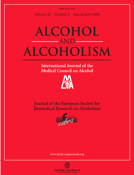 Mechanisms of Neurodegeneration and Regeneration in Alcoholism
Mechanisms of Neurodegeneration and Regeneration in Alcoholism
Alcohol and Alcoholism Advance Access published online on October 21, 2008
This is a review of preclinical studies covering alcohol-induced
brain neuronal death and loss of neurogenesis as well as abstinence-induced
brain cell genesis, e.g. brain regeneration. Efforts are made
to relate preclinical studies to human studies.
The
studies described are preclinical rat experiments using a 4-day
binge ethanol treatment known to induce physical dependence
to ethanol. Neurodegeneration and cognitive deficits following
binge treatment mimic the mild degeneration and cognitive deficits
found in humans. Various histological methods are used to follow
brain regional degeneration and regeneration.
Alcohol-induced
degeneration occurs due to neuronal death during alcohol intoxication.
Neuronal death is related to increases in oxidative stress in
brain that coincide with the induction of proinflammatory cytokines
and oxidative enzymes that insult brain. Degeneration is associated
with increased NF-

B proinflammatory transcription and decreased
CREB transcription. Corticolimbic brain regions are most sensitive
to binge-induced degeneration and induce relearning deficits.
Drugs that block oxidative stress and NF-

B transcription or
increase CREB transcription block binge-induced neurodegeneration,
inhibition of neurogenesis and proinflammatory enzyme induction.
Regeneration of brain occurs during abstinence following binge
ethanol treatment. Bursts of proliferating cells occur across
multiple brain regions, with many new microglia across brain
after months of abstinence and many new neurons in neurogenic
hippocampal dentate gyrus. Brain regeneration may be important
to sustain abstinence in humans.
Alcohol-induced
neurodegeneration occurs primarily during intoxication and is
related to increased oxidative stress and proinflammatory proteins
that are neurotoxic. Abstinence after binge ethanol intoxication
results in brain cell genesis that could contribute to the return
of brain function and structure found in abstinent humans.
Read Full AbstractRequest Reprint E-Mail: FTCrews@med.unc.edu______________________________________________________________
 Sensible proposals needed for alcohol
Sensible proposals needed for alcohol




 end of the serotonin transporter gene, is associated with smoking or alcohol consumption.
end of the serotonin transporter gene, is associated with smoking or alcohol consumption.






 -Receptor Antagonist BD-1063 Decreases Ethanol Intake and Reinforcement in Animal Models of Excessive Drinking
-Receptor Antagonist BD-1063 Decreases Ethanol Intake and Reinforcement in Animal Models of Excessive Drinking -Receptors (SigRs) have been implicated in behavioral and appetitive effects of psychostimulants and may also modulate the motivating properties of ethanol.
-Receptors (SigRs) have been implicated in behavioral and appetitive effects of psychostimulants and may also modulate the motivating properties of ethanol.





 B proinflammatory transcription and decreased CREB transcription. Corticolimbic brain regions are most sensitive to binge-induced degeneration and induce relearning deficits. Drugs that block oxidative stress and NF-
B proinflammatory transcription and decreased CREB transcription. Corticolimbic brain regions are most sensitive to binge-induced degeneration and induce relearning deficits. Drugs that block oxidative stress and NF-







 6, CAGE scores
6, CAGE scores 
 20 pack-years): HR, 0.96; 95% CI, 0.93-1.00. When
20 pack-years): HR, 0.96; 95% CI, 0.93-1.00. When 